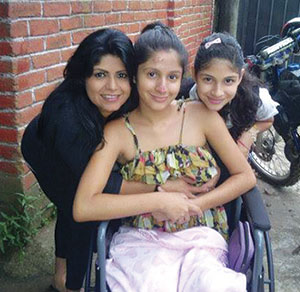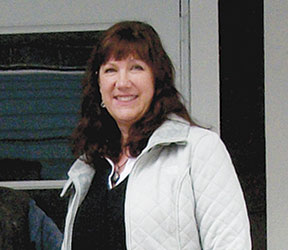Bombing victim aiding 13-year-old in need of prosthesis
*

Melissa Estefania Salinas and her family are looking forward to their forthcoming visit to the U.S., as soon as the red tape and logistics involved are resolved.
By Max Sullivan
After losing her leg and her best friend in the Boston Marathon bombing last April, Somerville resident Karen Rand has spent the last few months working to bring 13-year-old El Salvadorian Melissa Estefania Salinas to the United States for treatment of a similar affliction.
Salinas lost her right leg after a speeding car crashed into her on the street. So far, Rand and her boyfriend, Kevin McWatters, have helped raise as much as $11,000 and have gotten Shriners Hospital in Boston to give the girl free treatment and a prosthetic leg.
There is a major obstacle, though: The El Salvadorian government has said it is willing to let Salinas and her mother leave their home country for the United States, but not Salinas’ little sister. Only about 10 years old, the girl has nowhere to stay while the family is in the U.S., and Salinas cannot come to Boston without her mother.
In addition, it became apparent a couple of weeks ago that Salinas may have more health problems than initially thought. After reviewing the reports on Salinas’ progress in El Salvador, the doctors at Shriners were convinced that she likely has an infection in her leg.
In El Salvador, the doctors disagree; they say there is no infection.
If the American doctors are correct, then Salinas is not being treated for her infection, making time even tighter for all three members of Salinas’ family to get their visas.
“She could be in mortal danger because of the infection,” Rand said. “Because of the other leg, she could have to have the other leg amputated. The infection could get worse.”
Rand is working with a lawyer in El Salvador to get Salinas past what McWatters referred to as the “red tape” and into the U.S. From what Rand understands after speaking with the lawyer, Salinas’ younger sister will likely get through, though it could be a while. Even after conversations with their lawyer, Rand said the timing for Salinas’ sister’s visa is “totally random.”
“The doctors here at Shriners hospital, who are very good at working with getting visas from these countries, have prepared what they needed to prepare for documents, and so has Next Step [the company that is providing Salinas with her prosthetic leg when she gets to the U.S.],” Rand said. “They’ll be able to come, but we think that it’s not -obviously we already know it’s not – happening overnight. We know that they’re slow.”
Salinas’ story was first brought to the American public eye when Fox 25 did a story on Rand and what she went through at the 2013 Boston Marathon and how she has turned her sadness to inspiration to help others like Salinas. As Fox reported, Rand and McWatters met Mauricio Quiroga, an El Salvadorian who was friends with family friends of the Salinas. When Quiroga shared Salinas’ story with Rand and McWatters, they were compelled to reach out. With the help of Quiroga, who relays messages to El Salvador for Rand and McWatters, they’ve helped raise money for Salinas and have come just a 10-year-old’s visa away from getting Salinas to this country.

Somerville resident Karen Rand
Rand was recently contacted by Next Step Bionics and Prosthetics about appearing The Doctors, a Dr. Phil-produced TV show on CBS that is taped in Los Angeles. The show is looking to do an episode on victims of the marathon bombing. Rand said she is open to appearing on the show by satellite only, as it is still difficult for her to get on a plane and fly across country with the physical problems she’s dealt with since the marathon. Unless they are willing to talk about Salinas, however, she is not interested.
“I asked (the Next Step communications director) that before he has them contact me, I would want to know exactly what it is they want to talk to me about,” Rand said. “The only other thing I mentioned is that if I can’t talk about Estafania, then really I don’t really need to be on the TV show.”
Now that it’s been nine months since the marathon bombing took place, Rand is starting to feel like she can blend back into society for the first time in a while. Last summer and fall, Rand was approached constantly about the bombing, even while walking on the street. Some questions she received from strangers were troubling.
“It’s kind of nice to be fading back into people not really recognizing me,” Rand said. “It’s hard when people constantly want to come up to you and ask you questions and talk about things, and we learned that some of the things that people ask you are so rude, and so ignorant. It’s impossible even to imagine that people could say things like, ‘Oh, are you mentally disturbed now?’ I’ve just gotten to the point where I don’t want anyone to talk to me half the time.”
Rand said Salinas played a big part in her dealing with the trauma that came with experiencing the bombing.
“It is important to talk about Estefania,” Rand said, “because, for me, that’s what’s helped me in the mental health aspect of the (bombing): having a distraction and having someone else to help and working with someone who doesn’t have the opportunities that we have.”
For more information on Salinas, visit the Facebook page titled, “Melissa Estefanía Salinas Prosthetic Fund.”















Reader Comments